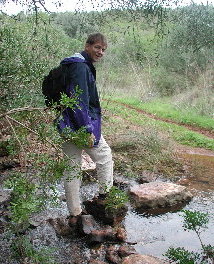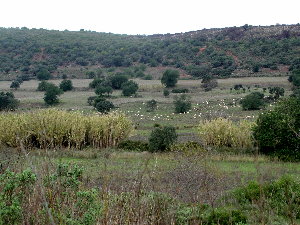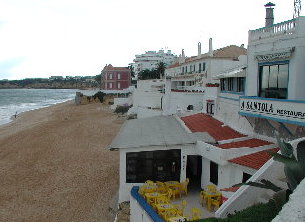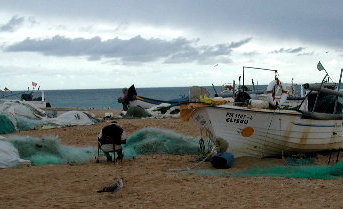Plaza de España with an example of hand-made azulejos work / Die Plaza de España mit einem Beispiel von handgefertigte Azulejo-Wand.
back to homepage / zurück zur Homepage
November 14 - 18, 2003: Sevilla (SP)
First overnight on our traditional beach Praia do Cabeço near
Monte Gordo with views to the ocean. On the next day -which began with
high winds a rain- we drove to Sevilla, directly to the Camping Sevilla
close to the airport. At about 3.30 PM we walked to catch the bus n°
70 that takes us into town. Weather had become better and we really could
enjoy visiting some parts of Sevilla. We had great tapas in the evening
before going to a flamenco show at Los Gallos (27 € each. with 2 €
discount because we had Rick Steve's book... - thank you, Mike and
Terri!). On the next day - a very sunny Sunday - we discovered more nice
places such as the Barrio de Alfalfa where we had delicious tapas at the
Bar Los Caracoles or Antonio. In the evening we went to a Flamenco show at
the place we had been 15 years ago, in the Patio Sevillano (29 €
each.) Back to the campground with a taxi (around 12 €). On our way
back driving the motorway out of Sevilla we had a tire explosion
-fortunately on the rear where we have double tires. We had all rear tires
exchanged for new ones, so now we should have no problems for a long time.
14.-18.11. 03: Sevilla (SP)
Wir haben erst am Abend vom 14. losfahren können, so dass wir an
unserem Stammplatz an der Praia do Cabeço mit Blick aufs Meer in
der Nähe von Monte Gordo übernachtet haben. Am nächsten Tag
regnete und stürmte es, trotzdem sind wir bis Sevilla durchgefahren.
Dort angekommen haben wir ein wenig gewartet bis das Unwetter vorüber
war und sind dann gegen 15.30 Uhr zur Bushaltestelle gegangen (ca. 1 km),
wo wir den Bus Nr. 70 in die Stadt genommen haben. So haben wir uns einige
Stunden Sevilla anschauen können. Abends tolles Tapas-Essen und
danach Flamenco-Show bei "Los Gallos" - Kostenpunkt: 27 €
p.P. abzüglich 2 € Rabatt für die, die das Buch vom
Amerikaner Rick Steve vorlegen können. Am nächsten Tag, einem
sonnigen Sonntag, haben wir noch weitere Ecken von Sevilla entdeckt u.a.
die Gegend von Alfalfa, wo wir auch sehr leckere Tapas im Resto Los
Caracoles oder Antonio vertilgt haben. Abends haben wir eine weitere
Flamenco-Show besucht und zwar im Lokal , wo wir vor 15 Jahren waren -
Patio Sevillano (29 € p.p.) Taxi zurück zum Campingplatz (ca. 12
€). Auf unserem Rückweg auf der Autobahn aus Sevilla ist uns ein
Hinterreifen geplatzt -ein Glück, dass wir Doppelbereifung haben,
dann war das nicht so schlimm! Am nächsten Tag haben wir alle
Hinterreifen für neue ausgetauscht, so dass wir für die nächste
Zeit keine Probleme mehr haben.
. . . . . .
Plaza de España with an example of hand-made azulejos work
/ Die Plaza de España mit einem Beispiel von handgefertigte
Azulejo-Wand.
. . . . . .
The cathedral with its Giralda tower. Some house walls in the old town
of Sevilla are built with old grinding stones. / Die Kathedrale mit
dem Giralda-Turm. Einige Hauswände in der Altstadt von Sevilla wurden
auf Mahlsteine gebaut.
Flamenco-Show at the Patio Sevillano / Flamenco-Show im Patio
Sevillano
November 29-30, 2003: Rocha da Pena, Salir,
Salgados/Albufeira (P)
Drive north of Loulé towards Salir to Rocha da Pena where we
parked our RV in front of the Cafe Bar das Grutas. It was already 2 PM
when we arrived, so we had a quick snack at this café before
heading up to Rocha da Pena. This walk took us along well marked paths
with the typical vegetation of the region up to the ridge of the cliffs
named Rocha da Pena (2 hours, about 7 km). After having conveniently been
able take fresh water at a well in front of the cafe, we drove back to
Salir. We found a quiet overnight stay in front of the school in a new
building area of this village. On the next day we drove to Benafim where
we started a walk through the Barrocal which is an area with rolling hills
north of Loulé. This area is known for its rich soil and the fruits
that grow there, e.g. almonds, oranges, lemons, and figs. This walk should
have taken us up to the Rocha dos Soidos, but first the weather wasn't
very positive to us and second, the description in our Let's Walk Algarve
book was not precise enough to guide us back. So we had to turn around and
come back the same way we came. Drive south towards Albufeira to Salgados,
a salt water pond full of birds just behind the dunes. This marsh area is
always full of interesting birds, like flamingos, white storks, various
kinds of herons, egrets, black-winged stilts etc. Unfortunately today
weather is not so good and the ponds are pretty dry. So we were only able
to see two lonely flamingos, two white storks, a Canadian goose, but as
much as 12 great herons! Overnight stay at Salgados. The next day began
with a walk through the area down to the Salgados Beach. There we
discovered why there was almost no water in the ponds: there is a passage,
like a river, going through the beach up to the ocean! And the water is
still running out. In the afternoon we drove the few kilometers to Armação
de Pêra, where we stopped at the east end of town and had a stroll
along the promenade.
29.-30.11. 03: Rocha da Pena, Salir, Salgados/Albufeira, Armação
de Pêra (P)
Fahrt nördlich von Loulé Richtung Salir nach Rocha da Pena,
wo wir unser Wohni vor dem Café Bar das Grutas geparkt haben. Da es
nicht mehr so früh war und es zur Zeit schon um 17.30 Uhr dunkel
wird, haben wir ein Imbiss in diesem Café eingenommen. Danach
Spaziergang hoch zu den Felsen von Rocha da Pena und entlang dem Kamm und
wieder runter zum Dorf. Bevor wir weitergefahren sind, konnten wir noch
Frischwasser am Dorfbrunnen entnehmen. Fahrt nach Salir, wo wir vor einer
Schule in einem Neubaugebiet sehr ruhig übernachtet haben. Am nächsten
Tag sind wir nach Benafim gefahren, ein kleines hübsches Dorf in der
Nähe vom mehr bekannten Alte, und haben von dort eine Wanderung im
Gebiet des Barrocal gestartet. Der Barrocal ist ein Gebiet sanfter Berghügel
nördlich von Loulé, der wegen seiner fruchtbaren Böden
und vielen Ernteprodukte (darunter Mandeln, Orangen, Zitronen und Feigen)
auch Garten der Algarve genannt wird. Es war sehr schwierig der
Beschreibung unseres Büchleins Let's Walk Algarve zu befolgen, und
wir sind mehrmals falsch gelaufen. Das Wetter war auch nicht unbedingt das
Beste, so dass wir nach 1,5 Stunden umgedreht sind und wieder "nach
Hause" gelaufen sind. Fahrt Richtung Albufeira, wo wir uns an dem
Marschgebiet von Salgados installiert haben, um Vögel zu beobachten.
Hier ist normalerweise eine reiche Vielfalt an Vögel zu beobachten,
wie z.B. Störche, Flamingos, Reiher etc. Heute waren die Seen aber
ziemlich trocken, das Wetter dazu auch nicht so vollkommen, und wir
konnten nur einige "interessante" Vögel sehen: zwei
Flamingos, zwei Störche, eine Kanadaganz, jedoch sage und schreibe 12
Graureiher! Am nächsten Tag sind wir bis zur Praia dos Salgados
gelaufen, und da konnten wir nun gesehen, dass das Wasser von dem
Marschgebiet ins Meer raus floss - in Form eines Flusses, den es vorher
nicht gab. Das Wasser hat sich einen Weg durch den Strand ins Meer
gegraben. Nachmittags sind wir die paar Kilometer bis Armação
de Pêra gefahren, wo wir uns am östlichen Rande der Stadt
gestellt haben und der Promenade entlang spazieren gegangen sind.
 Rocha da Pena: panoramic views up to the coast / Rocha da Pena:
ein fantastischer Panoramablick bis zur Küste!
Rocha da Pena: panoramic views up to the coast / Rocha da Pena:
ein fantastischer Panoramablick bis zur Küste!
 . . . . .
. . . . . 
The walk from Benafim that took us through typical Barrocal scenery. /
Die Wanderung von Benafim aus, das uns durch die typische
Barrocal-Landschaft geführt hat.
Salgados / Albufeira: This marsh area where we often watch for birds
is very dry this time. / Salgados bei Albufeira: Dieses Marschgebiet,
das wir öfters mal besuchen, ist dieses Mal besonders wasserarm.
 . . . . . .
. . . . . .

Armação de Pêra: although your first glance will
be on apartment buildings, the second one still reveals a cute fishing
town. / Armação de Pêra: auf dem ersten Blick
sieht man dort nur Apartmentgebäude, aber bei näherer
Betrachtung entdeckt man noch den süßen Fischerdorfkern.
back to homepage / zurück zur Homepage
to previous page / zur vorigen Seite . . . . to next page / zur nächsten Seite